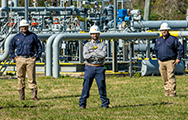Definitions and Cautionary note
Divestments is a measure used to monitor the progress of our divestment programme. This measure comprises proceeds from sale of property, plant and equipment and businesses, joint ventures and associates, and other Integrated Gas, Upstream and Downstream investments in equity securities, adjusted onto an accruals basis and for any share consideration received or contingent consideration initially recognised upon the related divestment, as well as proceeds from sale of interests in entities while retaining control (for example, proceeds from sale of interests in Shell Midstream Partners, L.P.).
The companies in which Royal Dutch Shell plc directly and indirectly owns investments are separate legal entities. In this Sustainability Report “Shell”, “Shell Group” and “Group” are sometimes used for convenience where references are made to Royal Dutch Shell plc and its subsidiaries in general. Likewise, the words “we”, “us” and “our” are also used to refer to Royal Dutch Shell plc and its subsidiaries in general or to those who work for them. These terms are also used where no useful purpose is served by identifying the particular entity or entities. “Subsidiaries”, “Shell subsidiaries” and “Shell companies” as used in this Sustainability Report refer to entities over which Royal Dutch Shell plc either directly or indirectly has control. Entities and unincorporated arrangements over which Shell has joint control are generally referred to as “joint ventures” and “joint operations”, respectively. Entities over which Shell has significant influence but neither control nor joint control are referred to as “associates”. The term “Shell interest” is used for convenience to indicate the direct and/or indirect ownership interest held by Shell in an entity or unincorporated joint arrangement, after exclusion of all third-party interest.
As used in this Report, “Accountable” is intended to mean: required or expected to justify actions or decisions. The Accountable person does not necessarily implement the action or decision (implementation is usually carried out by the person who is Responsible) but must organise the implementation and verify that the action has been carried out as required. This includes obtaining requisite assurance from Shell companies that the framework is operating effectively. “Responsible” is intended to mean: required or expected to implement actions or decisions. Each Shell company and Shell-operated venture is responsible for its operational performance and compliance with the Shell General Business Principles, Code of Conduct, Statement on Risk Management and Risk Manual, and Standards and Manuals. This includes responsibility for the operationalisation and implementation of Shell Group strategies and policies.
Also, in this report we may refer to Shell’s “Net Carbon Footprint”, which includes Shell’s carbon emissions from the production of our energy products, our suppliers’ carbon emissions in supplying energy for that production and our customers’ carbon emissions associated with their use of the energy products we sell. Shell only controls its own emissions. But, to support society in achieving the Paris Agreement goals, we aim to help such suppliers and consumers to likewise lower their emissions. The use of the term Shell’s “Net Carbon Footprint” is for convenience only and not intended to suggest these emissions are those of Shell or its subsidiaries. Shell’s operating plan, outlook and budgets are forecasted for a ten-year period and are updated every year. They reflect the current economic environment and what we can reasonably expect to see over the next ten years. Accordingly, Shell’s operating plans, outlooks, budgets and pricing assumptions do not reflect our net-zero emissions target. In the future, as society moves towards net-zero emissions, we expect Shell’s operating plans, outlooks, budgets and pricing assumptions to reflect this movement.
This report contains forward-looking statements (within the meaning of the U.S. Private Securities Litigation Reform Act of 1995) concerning the financial condition, results of operations and businesses of Shell. All statements other than statements of historical fact are, or may be deemed to be, forward-looking statements. Forward-looking statements are statements of future expectations that are based on management’s current expectations and assumptions and involve known and unknown risks and uncertainties that could cause actual results, performance or events to differ materially from those expressed or implied in these statements. Forward-looking statements include, among other things, statements concerning the potential exposure of Shell to market risks and statements expressing management’s expectations, beliefs, estimates, forecasts, projections and assumptions. These forward-looking statements are identified by their use of terms and phrases such as “aim”, “ambition”, “anticipate”, “believe”, “could”, “estimate”, “expect”, “goals”, “intend”, “may”, “objectives”, “outlook”, “plan”, “probably”, “project”, “risks”, “schedule”, “seek”, “should”, “target”, “will” and similar terms and phrases. There are a number of factors that could affect the future operations of Shell and could cause those results to differ materially from those expressed in the forward-looking statements included in this Sustainability Report, including (without limitation): (a) price fluctuations in crude oil and natural gas; (b) changes in demand for Shell’s products; (c) currency fluctuations; (d) drilling and production results; (e) reserves estimates; (f) loss of market share and industry competition; (g) environmental and physical risks; (h) risks associated with the identification of suitable potential acquisition properties and targets, and successful negotiation and completion of such transactions; (i) the risk of doing business in developing countries and countries subject to international sanctions; (j) legislative, fiscal and regulatory developments including regulatory measures addressing climate change; (k) economic and financial market conditions in various countries and regions; (l) political risks, including the risks of expropriation and renegotiation of the terms of contracts with governmental entities, delays or advancements in the approval of projects and delays in the reimbursement for shared costs; (m) risks associated with the impact of pandemics, such as the COVID-19 (coronavirus) outbreak; and (n) changes in trading conditions. No assurance is provided that future dividend payments will match or exceed previous dividend payments. All forward-looking statements contained in this Sustainability Report are expressly qualified in their entirety by the cautionary statements contained or referred to in this section. Readers should not place undue reliance on forward-looking statements. Additional risk factors that may affect future results are contained in Royal Dutch Shell plc’s Form 20-F for the year ended December 31, 2020 (available at www.shell.com/investor and www.sec.gov). These risk factors also expressly qualify all forward-looking statements contained in this Sustainability Report and should be considered by the reader. Each forward-looking statement speaks only as of the date of this Sustainability Report, April 7, 2021. Neither Royal Dutch Shell plc nor any of its subsidiaries undertake any obligation to publicly update or revise any forward-looking statement as a result of new information, future events or other information. In light of these risks, results could differ materially from those stated, implied or inferred from the forward-looking statements contained in this Sustainability Report.
The content of websites referred to in this Sustainability Report does not form part of this Sustainability Report.
We may have used certain terms, such as resources, in this Sustainability Report that the United States Securities and Exchange Commission (SEC) strictly prohibits us from including in our filings with the SEC. U.S. investors are urged to consider closely the disclosure in our Form 20-F, File No 1-32575, available on the SEC website www.sec.gov.
Shell PurePlus, Shell Helix, Shell Rimula, Shell Alexia, Shell V-Power, Shell Recharge, Shell GameChanger, Shell LiveWIRE and NXplorers are Shell trademarks.



